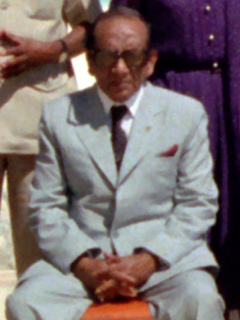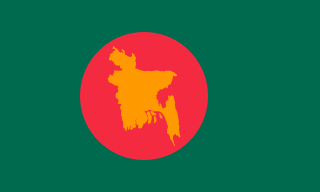Related Research Articles

Abdus Sattar was a Bangladeshi statesman. A leader of the Bangladesh Nationalist Party (BNP), he served as the president of Bangladesh from 1981 to 1982, and earlier as the vice president. A jurist by profession, Abdus Sattar held numerous constitutional and political offices in British India, East Pakistan and Bangladesh. He was a cabinet minister, supreme court judge, and chief election commissioner.

Shahabuddin Ahmed was a Bangladeshi politician who served as the President of Bangladesh from 1996 to 2001, and the Chief Justice of Bangladesh from 1990 to 1995. He previously served as the acting president during 1990–91 when Hussain Muhammad Ershad resigned from the post. He headed an interim government and held a general election in February 1991.

Abu Sadat Mohammad Sayem was a Bangladeshi jurist and statesman. He was first Chief Justice of Bangladesh from 1972 to 1975. He became the president of Bangladesh in the aftermath of counter-coups in November 1975. He was made Chief Martial Law Administrator. Sayem presided over a cabinet headed by the three chiefs of the armed forces. The cabinet included civilian technocrats and politicians. Sayem resigned on grounds of ill health in April 1977, and was replaced by President Ziaur Rahman.
Kamal Hossain, better known as Dr. Kamal, is a founding leader, lawyer and politician of Bangladesh. He is known as the "Father of the Bangladeshi Constitution" and regarded as an icon of secular democracy in the Indian subcontinent. Hossain currently heads his own law firm in Dhaka. He retired from political activities and from the post of president of Gano Forum in October 2023.

Chief Justice Hamoodur Rahman, NI. HI, was a Pakistani Bengali jurist and an academic who served as the Chief Justice of Pakistan from 18 November 1968 until 31 October 1975.

Sheikh Anwarul Haq, was a Pakistani jurist and an academic who served as the 9th Chief Justice of Pakistan from 23 September 1977 until resigning on 25 March 1981. He signed the death warrant for former Prime Minister Zulfikar Ali Bhutto in a controversial murder case. Bhutto was executed on April 4, 1979.

Abu Sayeed Chowdhury was a jurist and the second president of Bangladesh. Besides that, he held the positions of the Chairman of the United Nations Commission on Human rights, the vice-chancellor of the University of Dhaka, the Foreign Minister of Bangladesh and the first Bangladesh High Commissioner to the UK.

The High Court Division, Supreme Court of Bangladesh popularly known as the 'High Court' is one of the two divisions of the Supreme Court of Bangladesh, the other division being the Appellate Division. It consists of the Chief Justice of Bangladesh and the Judges of the High Court Division.

Saeed Uz Zaman Siddiqui was a Pakistani jurist and legislator of great prominence who formerly served as the 15th Chief Justice of Pakistan and, prior to that, the 7th Chief Justice of the Sindh High Court. At the time of his death, he was serving as the 31st Governor of Sindh.

Fazlul Karim was a Bangladeshi lawyer, businessman, politician and soldier. He was the first mayor of Cox's Bazar.

The Provisional Government of Bangladesh, popularly known as the Mujibnagar Government ; also known as the Bangladeshi government-in-exile, was a provisional government that was established following the proclamation of independence of East Pakistan as Bangladesh on 10 April 1971. Headed by prime minister Tajuddin Ahmad, it was the supreme leadership of the Bangladeshi liberation movement, comprising a cabinet, a diplomatic corps, an assembly, an armed force, and a radio service. It operated as a government-in-exile from Kolkata.
Shaykh Khūbū, better known as Quṭb ad-Dīn Khān Kokah was the Mughal subahdar of Bengal Subah during the reign of the emperor Jahangir. He was appointed governor of Bengal on 2 September 1606 and died in office on 20 May 1607.
Amin Ahmed NPk, MBE was a jurist and chief justice of the Dacca High Court.
Syed Mahbub Murshed was a Bangladeshi lawyer and jurist. He served as the Chief Justice of East Pakistan High Court during 1964–1967.
Chowdhury is a title of honour, usually hereditary, originating from the Indian subcontinent. It is an adaption from Sanskrit. During the Mughal rule, it was a title awarded to eminent people, while during British rule, the term was associated with zamindars and social leaders. The common female equivalent was Chowdhurani.
Mohammad Fazlul Karim is a Bangladeshi jurist who served as the 18th Chief Justice of Bangladesh.

Fazle Kaderi Mohammad Abdul Munim was a Bangladeshi jurist served as the 4th Chief Justice of Bangladesh and the former chief of Bangladesh Law Commission.

Iqbal Hameedur Rahman, was a senior judge of the Supreme Court of Pakistan. He is of Bengali origin and born in Dacca, East Pakistan. He served as the Justice of the Supreme Court of Pakistan, as appointed in this post on 24 February 2013 and voluntarily tendered his resignation on 24 October 2016.
Obaidul Hassan is a jurist who served as the 24th chief justice of the Supreme Court of Bangladesh. He was appointed as the chief justice on 12 September 2023. He also served as the president of the Inquiry Committee, 2022 for the formation of Bangladesh Election Commission. He was forced to resign as Chief Justice in the aftermath of the Non-cooperation movement (2024).
Mirza Ali Ispahani (1900-1982) was the Chief Justice of East Pakistan. He served as a secretary in the Ministry of Law and later as the Chief Justice of East Pakistan from 1959 to 1962. M.A Ispahani used to live in Dhaka's Ispahani Colony, his family estate. He married Monirea Rashti Ispahani and had a son with her, Mirza Shahab Ispahani. He died in 1982 and was buried in Dhaka.
References
- 1 2 3 4 5 6 7 Siddiky, Leila Rashida. "Siddiky, Justice Badruddin Ahmad". Banglapedia. Retrieved 2 January 2017.
- ↑ Māhaphuja Ullāha (2016). President Zia of Bangladesh : a political biography. Dhaka. p. 535. ISBN 978-984-20-0492-6. OCLC 956502101.
{{cite book}}: CS1 maint: location missing publisher (link)